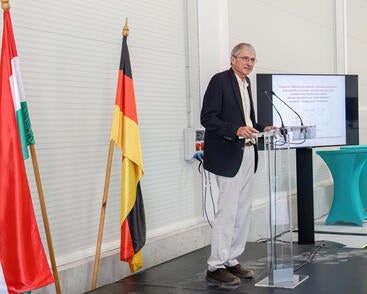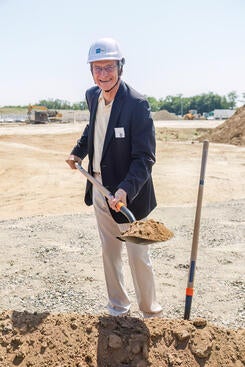
Nobel Laureate, Richard R. Schrock, Distinguished Professor of Chemistry at the University of California, Riverside College of Natural & Agricultural Sciences, recently returned from Hungary where he attended a groundbreaking ceremony to build a new facility that will manufacture metathesis catalysts that enable environmentally friendly chemical processes. The production technology is based on his pioneering work and for which he won the Nobel Prize for Chemistry in 2005, specifically for the development of the metathesis method in organic synthesis.
XiMo, the company that Dr. Schrock co-founded to underpin the catalyst research, is a wholly-owned subsidiary of its parent company, Verbio which is domiciled in Southern Germany and which isolates oleic acid esters along with other things from sea oils, glycol and steroyls.
“Now that the plant, which is near Budapest, has become a reality, it is a big deal!” he says. “As to what the ongoing benefit will be— time will tell (the plant’s production launch is scheduled for next summer). If the plant and what it produces is successful, and I publish some papers that demonstrate how to make the catalyst more cheaply, UCR will get tremendous credit.”
The plant will enable the large-scale production of advanced catalysts that drive olefin metathesis—a transformative chemical reaction at the heart of greener, more sustainable chemistry. This cutting-edge technology empowers the chemical industry to replace fossil-based feedstocks with renewable, plant-derived alternatives such as rapeseed methyl ester. By enabling the efficient conversion of bio-based raw materials into high-value products—including pheromones for sustainable crop protection, plant-based flavors and fragrances, lubricants, surfactants, and polymers—olefin metathesis plays a vital role in reducing adverse environmental impact and enables an easier transition to a low-carbon economy.
“The current efforts by XiMo to commercialize Schrock-type catalysts represent a remarkable full-circle moment: fundamental academic research now enabling scalable industrial processes,” says Leonard Mueller, Professor of Chemistry and Chair of the Chemistry Department at UCR. “While it is too early to predict the full impact of this commercialization, the symbolic value is profound. It sends a clear message to students and researchers alike that work born from pure scientific curiosity can have far-reaching consequences.”
A significant share of the catalysts produced at the plant near Budapest will be used by Verbio in its new plant for bio-based chemicals in Bitterfeld, Germany. There, the company is currently building the world’s first Ethenolysis plant to manufacture renewable molecules from rapeseed methyl ester—marking another key milestone in Verbio’s commitment to sustainable innovation
Historically, Dr. Schrock entered the field at a time when olefin metathesis was still a mechanistic mystery. Early observations showed that certain mixtures could promote the reaction, but no one had identified a truly effective or mechanistically understood catalyst. “Initially, Dr. Schrock’s interests were not focused on metathesis,” Prof. Mueller says. “He was focused on the synthesis of homoleptic organometallic complexes. However, through this seemingly tangential line of inquiry, he uncovered an entirely new class of metal-carbon multiple bonds. His synthesis of tantalum and later molybdenum and tungsten alkylidenes provided not only the first structurally well-defined catalysts for olefin metathesis, but also a new window into organometallic reactivity.”
Prof. Mueller says that Dr. Schrock’s work was deeply fundamental and motivated by intellectual curiosity. And yet, this basic research laid the foundation for a reaction that is now indispensable in the synthesis of pharmaceuticals, advanced materials, and petrochemicals. “This is the kind of long-arc scientific achievement that the Nobel Prize is meant to honor,” he says.
Dr. Schrock’s connection with UCR started in 1963 when he was an undergraduate at the university. “When I semi-retired from MIT in 2018, I was in touch with Matthew Conley (Professor of Chemistry at UCR) and shortly thereafter I was contacted by the provost and she asked me if I was interested in coming back to UC Riverside to do research. So I retired from MIT and became a professor at UCR. What goes around comes around!”
He is currently Distinguished Professor and George Helmkamp Founders Professor of Chemistry at UCR.
Dr. Schrock says his first appointment at UCR in 2018 was for five years and ended in 2023. “And then they reappointed me for another five years until 2028. “Will they reappoint me at the end of that term, we’ll see.
“I’m thinking about where I’m going to leave my archives, he adds with a laugh, so maybe they will reappoint me! MIT has a dozen Nobel Laureates and UCR has one homegrown one – me!”
“Even before Dr. Schrock received the Nobel Prize in Chemistry in 2005, we were immensely proud that he began his scientific journey here as an undergraduate,” says Prof. Mueller. “His groundbreaking work in olefin metathesis has fundamentally reshaped the field of synthetic chemistry and exemplifies how curiosity-driven research can lead to transformative discoveries with global impact.”
According to Prof. Mueller, beyond his scientific legacy, Dr. Schrock has already made a lasting impact on UCR’s Chemistry department and its students. He recently endowed a distinguished lectureship in the UCR Chemistry Department, launching this year, and established an award for outstanding inorganic chemistry graduate students.
“Having a Nobel Laureate on our faculty, especially one so deeply rooted in the tradition of curiosity-driven science, raises the profile of the department and the university as a whole,” Prof. Mueller says. “It opens doors for recruitment, collaboration, and elevates the aspirations of our students. It reminds them, and all of us, that the pursuit of deep understanding can change the world.”

